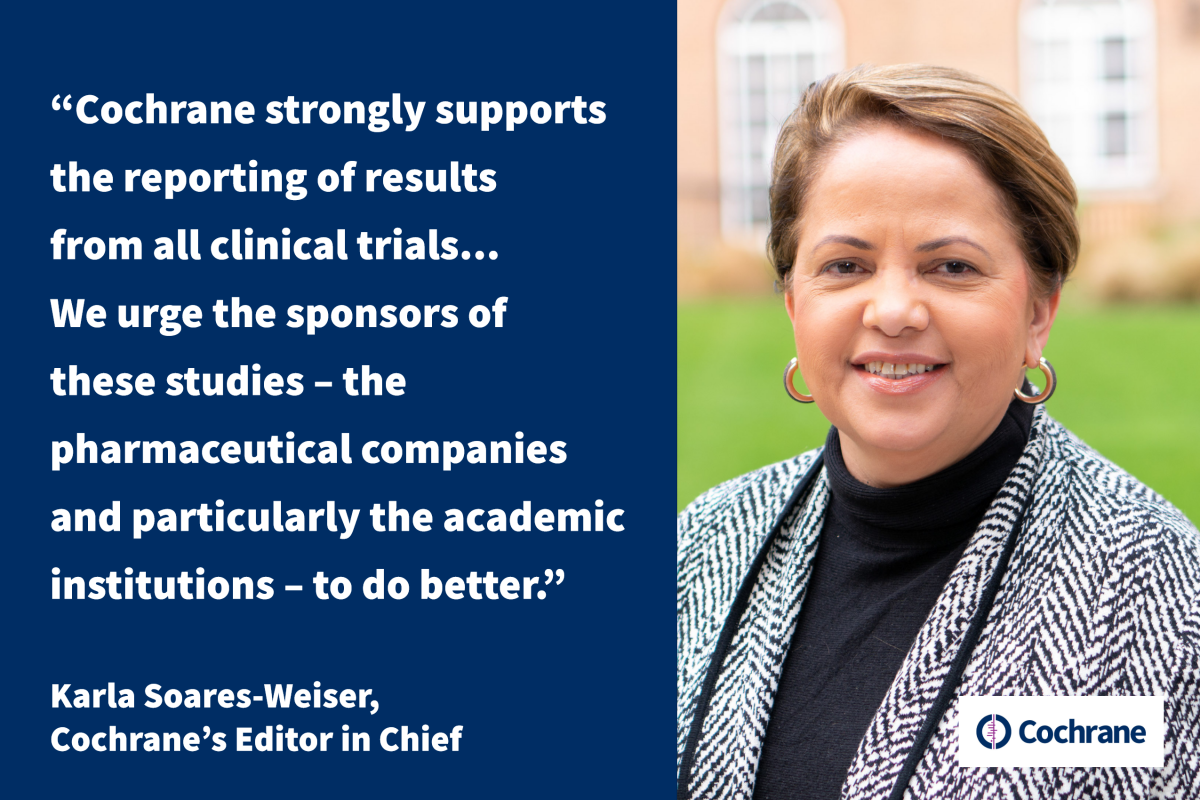
Cochrane is for anyone interested in using high-quality information to make health decisions. Whether you are a doctor or nurse, patient or carer, researcher or funder, Cochrane evidence provides a powerful tool to enhance your healthcare knowledge and decision making. Our mission is to promote evidence-informed health decision-making by producing high-quality, relevant, accessible systematic reviews and other synthesized research evidence.
July to September 2019, was a busy quarter for Cochrane! Here we provide some highlights of the third quarter of the year.

Cochrane produces high-quality, relevant, up-to-date systematic reviews, and other synthesized research evidence to inform health decision making. This quarter we were delighted to hear that Professor Julian Higgins received the 2019 Extraordinary Service Award at the Society for Research Synthesis Methodology 2019 Annual Meeting. Julian also has a long-standing history in Cochrane, contributing to the development of methods that are integral to the Reviews Cochrane produces.
An article was published in Nature, 'Out of date before it's published' which looked at how Cochrane is keeping pace with fast-moving research fields. It featured the work of Cochrane to increase the speed and efficiency of Cochrane systematic review production. Another article in the Journal of Orthopaedic & Sports Physical Therapy comparing low back pain systematic review abstracts to their full text. It found that "Cochrane review abstracts had substantial to almost perfect agreement with the full text".

Cochrane strives to produce evidence that is accessible and useful to everybody, everywhere in the world. We create Plain Language Summaries, provide podcasts from Cochrane Review Authors, translate our work into 15 languages, and provide Cochrane Clinical Answers. On average we had 242,000 page views of Cochrane.org per day.
The British Medical Journal 'Talk Medicine' podcast featured the work of Cochrane Austria in the Podcast "Fighting bad science in Austria". Gerald Gartlehner, Director of Cochrane Austria, explained how they are testing the truth of medical statements made in the media in order to support readers, patients, doctors, and decision-makers to critically analyze the information they encounter. The Skeptics' Guide to EM podcast talked to the Cochrane Acute and Emergency Care Network about their work and Cochrane. An article highlighting an innovative approach developed by WHO and Cochrane to ensure that global recommendations on maternal and perinatal health are up to date was recently published in BMJ Global Health.

Cochrane is the ‘home of evidence' to inform health decision making. We are building greater recognition of our work and becoming the leading advocate for evidence-informed health care.
During Q3, Cochrane started work on a series of advocacy priorities for 2020 and 2021. Cochrane’s Editor in Chief , Karla Soares-Weiser supported an open letter co-authored by the European Commission (EC), the European Medicines Agency (EMA) and the Heads of Medicines Agencies (HMA), reminding clinical trial sponsors of their obligation to make their results public. Cochrane co-signed a letter to Norman Lamb MP, asking him to call on the UK Health Research Authority to add sanctions for noncompliance to their new research transparency policy, in line with UK Parliament recommendations. Within a few days, he responded in support of the letter and agreed to write to the HRA. Karla and members of the Cochrane Clinical Study Report Working Group also published an open letter in response to the FDA consultation on its Clinical Data Summary Report Pilot.
In addition, Cochrane will participate in an event at the EU Parliament on transparency and clinical trials in the EU alongside representatives of EMA, the EC and several research integrity and transparency organizations – presenting the importance of trial transparency for systematic reviewers.

A big achievement this quarter was launching 'Evidence Essentials: An introduction to evidence-based medicine and systematic reviews'. This online learning is freely available to anyone who is interested in an introduction to Evidence Based Medicine, Cochrane evidence and how to use it.

Cochrane UK highlighted their work going into UK schools in an outreach programme to teach children about Evidence-Based Medicine and Cochrane. Cochrane also launched #BetterPoster templates for conference posters that have less text and a decluttered design with the main finding in plain English as the highlighted feature. And to help people understand what Evidence Syntheses is and why we need it, Cochrane Ireland and Evidence Synthesis Ireland produced this great video:
 Cochrane strives to a be a diverse, inclusive, and transparent international organization that effectively harnesses the enthusiasm and skills of our contributors, is guided by our principles, governed accountably, managed efficiently, and makes optimal use of its resources.
Cochrane strives to a be a diverse, inclusive, and transparent international organization that effectively harnesses the enthusiasm and skills of our contributors, is guided by our principles, governed accountably, managed efficiently, and makes optimal use of its resources.
In July, we made our 2018 Annual Review available. It highlighted Cochrane’s key achievements during 2018 and the strides being made on our major Strategy to 2020 initiatives.
In Q4, we will be gathering for the Cochrane Santiago 2019 Colloquium, with an excellent Scientific Programme being announced. This year’s scientific program is highly focused on the over-arching Colloquium theme, ‘Embracing Diversity’, which will be carried out through plenaries from global speakers, special sessions, oral presentations, and workshops. Cochrane also announced that in 2021 we will join with JBI, Campbell Collaboration and Guidelines International Network to host of the Global Evidence Summit (GES) in the Czech Republic, Prague.

